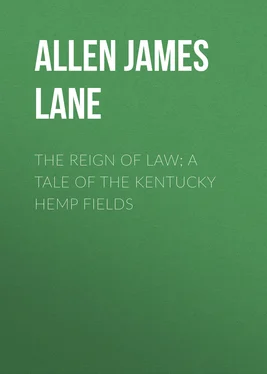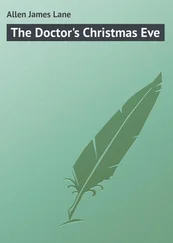James Allen - The Reign of Law; a tale of the Kentucky hemp fields
Здесь есть возможность читать онлайн «James Allen - The Reign of Law; a tale of the Kentucky hemp fields» — ознакомительный отрывок электронной книги совершенно бесплатно, а после прочтения отрывка купить полную версию. В некоторых случаях можно слушать аудио, скачать через торрент в формате fb2 и присутствует краткое содержание. Жанр: foreign_prose, foreign_antique, на английском языке. Описание произведения, (предисловие) а так же отзывы посетителей доступны на портале библиотеки ЛибКат.
- Название:The Reign of Law; a tale of the Kentucky hemp fields
- Автор:
- Жанр:
- Год:неизвестен
- ISBN:нет данных
- Рейтинг книги:5 / 5. Голосов: 1
-
Избранное:Добавить в избранное
- Отзывы:
-
Ваша оценка:
- 100
- 1
- 2
- 3
- 4
- 5
The Reign of Law; a tale of the Kentucky hemp fields: краткое содержание, описание и аннотация
Предлагаем к чтению аннотацию, описание, краткое содержание или предисловие (зависит от того, что написал сам автор книги «The Reign of Law; a tale of the Kentucky hemp fields»). Если вы не нашли необходимую информацию о книге — напишите в комментариях, мы постараемся отыскать её.
The Reign of Law; a tale of the Kentucky hemp fields — читать онлайн ознакомительный отрывок
Ниже представлен текст книги, разбитый по страницам. Система сохранения места последней прочитанной страницы, позволяет с удобством читать онлайн бесплатно книгу «The Reign of Law; a tale of the Kentucky hemp fields», без необходимости каждый раз заново искать на чём Вы остановились. Поставьте закладку, и сможете в любой момент перейти на страницу, на которой закончили чтение.
Интервал:
Закладка:
Had there been call to do this before the war, it might not have been done. But now men young and old, who had never known what work was, were replacing their former slaves. The preexisting order had indeed rolled away like a scroll; and there was the strange fresh universal stir of humanity over the land like the stir of nature in a boundless wood under a new spring firmament He was one of a multitude of new toilers; but the first in his neighborhood, and alone in his grim choice of work.
So dragged that winter through. When spring returned, he did better. With his father's approval, he put in some acres for himself—sowed it, watched it, prayed for it; in summer cut it; with hired help stacked it in autumn; broke it himself the winter following; sold it the next spring; and so found in his pocket the sorely coveted money.
This was increased that summer from the sale of cord wood, through driblets saved by his father and mother; and when, autumn once more advanced with her days of shadow and thoughtfulness—two years having now passed—he was in possession of his meagre fortune, wrung out of earth, out of sweat and strength and devotion.
Only a few days remained now before his leaving for the university—very solemn tender days about the house with his father and mother.
And now for the lad's own sake, as for the clearer guidance of those who may care to understand what so incredibly befell him afterward, an attempt must be made to reveal somewhat of his spiritual life during those two years. It was this, not hard work, that writ his history.
As soon as he had made up his mind to study for the ministry, he had begun to read his Bible absorbingly, sweeping through that primitive dawn of life among the Hebrews and that second, brilliant one of the Christian era. He had few other books, none important; he knew nothing of modern theology or modern science. Thus he was brought wholly under the influence of that view of Man's place in Nature which was held by the earliest Biblical writers, has imposed itself upon countless millions of minds since then, and will continue to impose itself—how much longer?
As regarded, then, his place in Nature, this boy became a contemporary of the Psalmist; looked out upon the physical universe with the eye of Job; placed himself back beside that simple, audacious, sublime child—Man but awakening from his cradle of faith in the morning of civilization. The meaning of all which to him was this: that the most important among the worlds swung in space was the Earth, on account of a single inhabitant—Man. Its shape had been moulded, its surface fitted up, as the dwelling-place of Man. Land, ocean, mountain-range, desert, valley—these were designed alike for Man. The sun—it was for him; and the moon; and the stars, hung about the earth as its lights—guides to the mariner, reminders to the landsman of the Eye that never slumbered. The clouds—shade and shower—they were mercifully for Man. Nothing had meaning, possessed value, save as it derived meaning and value from him. The great laws of Nature—they, too, were ordered for Man's service, like the ox and the ass; and as he drove his ox and his ass whither he would, caused them to move forward or to stop at the word of command, so Man had only to speak properly (in prayer) and these laws would move faster or less fast, stop still, turn to the right or the left side of the road that he desired to travel. Always Man, Man, Man, nothing but Man! To himself measure of the universe as to himself a little boy is sole reason for the food and furnishings of his nursery.
This conception of Man's place in Nature has perhaps furnished a very large part of the history of the world. Even at this close of the nineteenth century, it is still, in all probability, the most important fact in the faith and conduct of the race, running with endless applications throughout the spheres of practical life and vibrating away to the extremities of the imagination. In the case of this poor, devout, high-minded Kentucky boy, at work on a farm in the years 1866 and 1867, saving his earnings and reading his Bible as the twofold preparation for his entrance into the Christian ministry, this belief took on one of its purest shapes and wrought out in him some of its loftiest results.
Let it be remembered that he lived in a temperate, beautiful, bountiful country; that his work was done mostly in the fields, with the aspects of land and sky ever before him; that he was much alone; that his thinking was nearly always of his Bible and his Bible college. Let it be remembered that he had an eye which was not merely an opening and closing but a seeing eye—full of health and of enjoyment of the pageantry of things; and that behind this eye, looking through it as through its window, stood the dim soul of the lad, itself in a temple of perpetual worship: these are some of the conditions which yielded him during these two years the intense, exalted realities of his inner life.
When of morning he stepped out of the plain farm-house with its rotting doors and leaking roof and started off joyously to his day's work, at the sight of the great sun just rising above the low dew-wet hills, his soul would go soaring away to heaven's gate. Sometimes he would be abroad late at night, summoning the doctor for his father or returning from a visit to another neighborhood. In every farmhouse that he passed on the country road the people were asleep—over all the shadowy land they were asleep. And everywhere, guardian in the darkness, watched the moon, pouring its searching beams upon every roof, around every entrance, on kennel and fold, sty and barn—with light not enough to awaken but enough to protect: how he worshipped toward that lamp tended by the Sleepless! There were summer noons when he would be lying under a solitary tree in a field—in the edge of its shade, resting; his face turned toward the sky. This would be one over-bending vault of serenest blue, save for a distant flight of snow-white clouds, making him think of some earthward-wandering company of angels. He would lie motionless, scarce breathing, in that peace of the earth, that smile of the Father. Or if this same vault remained serene too long; if the soil of the fields became dusty to his boots and his young grain began to wither, when at last, in response to his prayer, the clouds were brought directly over them and emptied down, as he stepped forth into the cooled, dripping, soaking green, how his heart blessed the Power that reigned above and did all things well!
It was always praise, gratitude, thanks-giving, whatever happened. If he prayed for rain for his crops and none was sent, then he thought his prayer lacked faith or was unwise, he knew not how; if too much rain fell, so that his grain rotted, this again was from some fault of his or for his good; or perhaps it was the evil work of the prince of the powers of the air—by permission of the Omnipotent. In the case of one crop all the labor of nearly a year went for nothing: he explained this as a reminder that he must be chastened.
Come good, come ill, then, crops or no crops, increase or decrease, it was all the same to him: he traced the cause of all plenty as of all disappointment and disaster reaching him through the laws of nature to some benevolent purpose of the Ruler. And ever before his eyes also he kept that spotless Figure which once walked among men on earth—that Saviour of the world whose service he was soon to enter, whose words of everlasting life he was to preach: his father's farm became as the vineyard of the parables in the Gospels, he a laborer in it.
Thus this lad was nearer the first century and yet earlier ages than the nineteenth. He knew more of prophets and apostles than modern doctors of divinity. When the long-looked-for day arrived for him to throw his arms around his father and mother and bid them good-by, he should have mounted a camel, like a youth of the Holy Land of old, and taken his solemn, tender way across the country toward Jerusalem.
Читать дальшеИнтервал:
Закладка:
Похожие книги на «The Reign of Law; a tale of the Kentucky hemp fields»
Представляем Вашему вниманию похожие книги на «The Reign of Law; a tale of the Kentucky hemp fields» списком для выбора. Мы отобрали схожую по названию и смыслу литературу в надежде предоставить читателям больше вариантов отыскать новые, интересные, ещё непрочитанные произведения.
Обсуждение, отзывы о книге «The Reign of Law; a tale of the Kentucky hemp fields» и просто собственные мнения читателей. Оставьте ваши комментарии, напишите, что Вы думаете о произведении, его смысле или главных героях. Укажите что конкретно понравилось, а что нет, и почему Вы так считаете.












